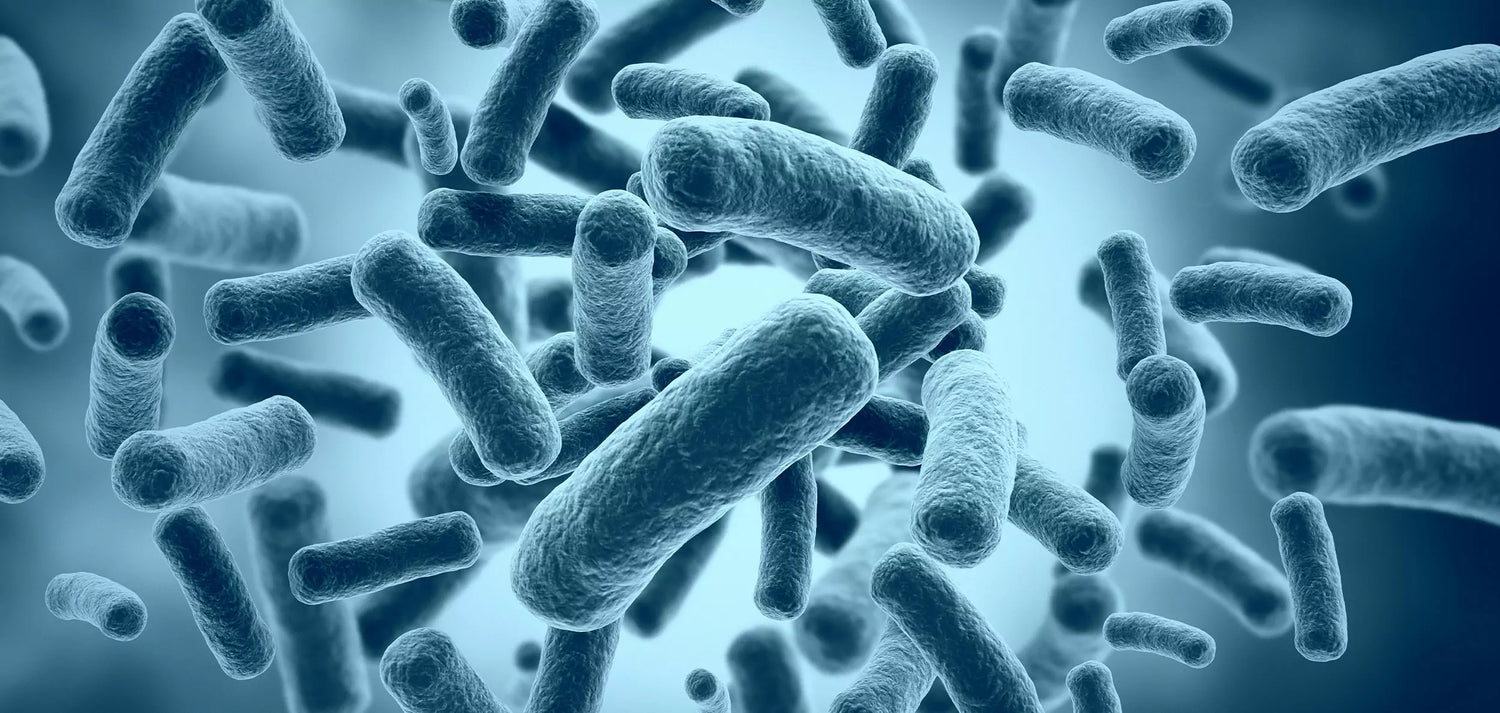
Scientific Publications
Learn more about the academic research undertaken by The Akkermansia Company™ and download the latest scientific studies.
Our Latest Studies
Pre-Clinical Observations
Microbes4U® Study
Irritable Bowel Study
Our Scientific Publications
All studies below were performed using the Akkermansia muciniphila MucT strain.
Akkermansia muciniphila gen. nov., sp. nov., a human intestinal mucin-degrading bacterium, 2004
This study is about the discovery of the Akkermansia muciniphila MucT strain.
Expand Abstract
This study is about the discovery of the Akkermansia muciniphila MucT strain.
The diversity of mucin-degrading bacteria in the human intestine was investigated by combining culture and 16S rRNA-dependent approaches. A dominant bacterium, strain MucT, was isolated by dilution to extinction of feces in anaerobic medium containing gastric mucin as the sole carbon and nitrogen source. A pure culture was obtained using the anaerobic soft agar technique. Strain MucT was a Gram-negative, strictly anaerobic, non-motile, non-spore-forming, oval-shaped bacterium that could grow singly and in pairs. When grown on mucin medium, cells produced a capsule and were found to aggregate. Strain MucT could grow on a limited number of sugars, including N-acetylglucosamine, N-acetylgalactosamine and glucose, but only when a protein source was provided and with a lower growth rate and final density than on mucin. The G + C content of DNA from strain MucT was 47*6 mol%. 16S rRNA gene sequence analysis revealed that the isolate was part of the division Verrucomicrobia. The closest described relative of strain MucT was Verrucomicrobium spinosum (92% sequence similarity). Remarkably, the 16S rRNA gene sequence of strain MucT showed 99% similarity to three uncultured colonic bacteria. According to the data obtained in this work, strain MucT represents a novel bacterium belonging to a new genus in subdivision 1 of the Verrucomicrobia; the name Akkermansia muciniphila gen. nov., sp. nov. is proposed; the type strain is MucT (=ATCCBAA-835T=CIP107961T).
Supplementation with Akkermansia muciniphila in overweight and obese human volunteers: a proof-of-concept exploratory study, 2019
Expand Abstract
Strain used: Live and pasteurized Akkermansia muciniphila MucT.
Metabolic syndrome is characterized by a constellation of comorbidities that predispose individuals to an increased risk of developing cardiovascular pathologies as well as type 2 diabetes mellitus. The gut microbiota is a new key contributor involved in the onset of obesity-related disorders. In humans, studies have provided evidence for a negative correlation between Akkermansia muciniphila abundance and overweight, obesity, untreated type 2 diabetes mellitus or hypertension3–8. Since the administration of A. muciniphila has never been investigated in humans, we conducted a randomized, double-blind, placebo-controlled pilot study in overweight/obese insulin-resistant volunteers; 40 were enrolled and 32 completed the trial. The primary end points were safety, tolerability and metabolic parameters (that is, insulin resistance, circulating lipids, visceral adiposity and body mass). Secondary outcomes were gut barrier function (that is, plasma lipopolysaccharides) and gut microbiota composition. In this single-center study, we demonstrated that daily oral supplementation of 1010 A. muciniphila bacteria either live or pasteurized for three months was safe and well tolerated. Compared to placebo, pasteurized A. muciniphila improved insulin sensitivity (+28.62 ± 7.02%, P = 0.002), and reduced insulinemia (−34.08 ± 7.12%, P = 0.006) and plasma total cholesterol (−8.68 ± 2.38%, P = 0.02). Pasteurized A. muciniphila supplementation slightly decreased body weight (−2.27 ± 0.92 kg, P = 0.091) compared to the placebo group, and fat mass (−1.37 ± 0.82 kg, P = 0.092) and hip circumference (−2.63 ± 1.14 cm, P = 0.091) compared to baseline. After three months of supplementation, A. muciniphila reduced the levels of the relevant blood markers for liver dysfunction and inflammation while the overall gut microbiome structure was unaffected. In conclusion, this proof-of-concept study (clinical trial no. NCT02637115) shows that the intervention was safe and well tolerated and that supplementation with A. muciniphila improves several metabolic parameters.
Serum metabolite profiling yields insights into health promoting effect of Akkermansia muciniphila in human volunteers with a metabolic syndrome, 2021
Expand Abstract
Strain used: Live and pasteurized Akkermansia muciniphila MucT.
Reduction of A. muciniphila relative abundance in the gut microbiota is a widely accepted signature associated with obesity-related metabolic disorders. Using untargeted metabolomics profiling of fasting plasma, our study aimed at identifying metabolic signatures associated with beneficial properties of alive and pasteurized A. muciniphila when administrated to a cohort of insulin-resistant individuals with metabolic syndrome. Our data highlighted either shared or specific alterations in the metabolome according to the form of A. muciniphila administered with respect to a control group. Common responses encompassed modulation of amino acid metabolism, characterized by reduced levels of arginine and alanine, alongside several intermediates of tyrosine, phenylalanine, tryptophan, and glutathione metabolism. The global increase in levels of acylcarnitines together with specific modulation of acetoacetate also suggested induction of ketogenesis through enhanced β-oxidation. Moreover, our data pinpointed some metabolites of interest considering their emergence as substantial compounds pertaining to health and diseases in the more recent literature.
Toxicological safety evaluation of pasteurized Akkermansia muciniphila 2020
Expand Abstract
Strain used: Pasteurized Akkermansia muciniphila MucT.
Gut microorganisms are vital for many aspects of human health, and the commensal bacterium Akkermansia muciniphila has repeatedly been identified as a key component of intestinal microbiota. Reductions in A. muciniphila abundance are associated with increased prevalence of metabolic disorders such as obesity and type 2 diabetes. It was recently discovered that administration of A. muciniphila has beneficial effects and that these are not diminished, but rather enhanced after pasteurization. Pasteurized A. muciniphila is proposed for use as a food ingredient, and was therefore subjected to a nonclinical safety assessment, comprising genotoxicity assays (bacterial reverse mutation and in vitro mammalian cell micronucleus tests) and a 90-day toxicity study. For the latter, Han Wistar rats were administered with the vehicle or pasteurized A. muciniphila at doses of 75, 375 or 1500mg/kg bodyweight/day (equivalent to 4.8×109, 2.4×1010, or 9.6×1010 A. muciniphila cells/kg body weight/day) by oral gavage for 90 consecutive days. The study assessed potential effects on clinical observations (including detailed arena observations and a modified Irwin test), bodyweight, food and water consumption, clinical pathology, organ weights, and macroscopic and microscopic pathology. The results of both invitro genotoxicity studies were negative. No test item-related adverse effects were observed in the 90-day study; therefore, 1500mg/kg body weight/day (the highest dose tested, equivalent to 9.6×1010 A. muciniphila cells/kg body weight/day) was established as the no-observed-adverse-effect-level. These results support that pasteurized A.muciniphila is safe for use as a food ingredient.
Cross-talk between Akkermansia muciniphila and intestinal epithelium controls diet-induced obesity, 2013
Expand Abstract
Strain used: Live Akkermansia muciniphila MucT.
Obesity and type 2 diabetes are characterized by altered gut microbiota, inflammation, and gut barrier disruption. Microbial composition and the mechanisms of interaction with the host that affect gut barrier function during obesity and type 2 diabetes have not been elucidated. We recently isolated Akkermansia muciniphila, which is a mucin-degrading bacterium that resides in the mucus layer. The presence of this bacterium inversely correlates with body weight in rodents and humans. However, the precise physiological roles played by this bacterium during obesity and metabolic disorders are unknown. This study demonstrated that the abundance of A. muciniphila decreased in obese and type 2 diabetic mice. We also observed that prebiotic feeding normalized A. muciniphila abundance, which correlated with an improved metabolic profile. In addition, we demonstrated that A. muciniphila treatment reversed high-fat diet-induced metabolic disorders, including fat-mass gain, metabolic endotoxemia, adipose tissue inflammation, and insulin resistance. A. muciniphila administration increased the intestinal levels of endocannabinoids that control inflammation, the gut barrier, and gut peptide secretion. Finally, we demonstrated that all these effects required viable A. muciniphila because treatment with heat-killed cells did not improve the metabolic profile or the mucus layer thickness. In summary, this study provides substantial insight into the intricate mechanisms of bacterial (i.e., A. muciniphila) regulation of the cross-talk between the host and gut microbiota. These results also provide a rationale for the development of a treatment that uses this human mucus colonizer for the prevention or treatment of obesity and its associated metabolic disorders.
Industry Publications
Learn more about relevant studies and discussions concerning Akkermansia muciniphila and gut health.
FAQs
We're here to help. Get to know more about Akkermansia muciniphila MucTTM products from formulation to when and how to take them
What evidence is there that Akkermansia muciniphila MucTTM works best when taken for three months?
There are several clinical studies taking place where Akkermansia muciniphila MucTTM efficacy data is available highlighting results in those taking the product for between 3 to 6 months. The proof of concept study, where participants took the product for 3 months, indicates an effect on metabolic syndrome with prediabetes and/or lipid disorders in the blood and obesity.1
Can Akkermansia muciniphila MucTTM be stored at room temperature?
Yes, Akkermansia muciniphila MucTTM can be stored at room temperature. It does not need to be kept in the refrigerator.
When is the best time to take Akkermansia muciniphila MucTTM?
We advise that Akkermansia muciniphila MucTTM be taken alongside a meal, ideally breakfast.1
How long should people take Akkermansia muciniphila MucTTM?
In some cases, individuals will feel the benefits of Akkermansia muciniphila MucTTM after a few weeks, while others will require more time. The proof of concept study in humans indicates that taking it daily for three months had a positive effect on the gut barrier, sugar and fat metabolism and liver function in people who have a metabolic syndrome including overweight or obesity and prediabetes.1
Why is Akkermansia muciniphila MucTTM pasteurized?
Our preclinical studies and proof of concept trial* found that the pasteurized form of Akkermansia muciniphila MucTTM was even more beneficial than the live strain with regard to its effect on gut barrier function, insulin sensitivity, fat mass composition, dyslipidemia and immune homeostasis.
Why is Chromium used in Healthy Weight? And is it available without Chromium?
Chromium is added to Healthy Weight to improve insulin sensitivity. It is used in accordance with the EU Health Claims Register claim that Chromium contributes to the maintenance of normal blood glucose concentrations. No, this product is not available without chromium.
How much caffeine is there in the green tea extract used in Healthy Weight?
There is less than 1% caffeine (based upon the technical info).
Can Healthy Weight be taken with other products that support the gut?
Yes, Healthy Weight can be taken alongside other products. Akkermansia muciniphila MucTTM in its pasteurized form is active in the gut without any known enzymatic drug-microbiome interactions and is subsequently excreted in the stool. As a result, it doesn't interfere with the metabolism of any drug that is absorbed into the body. It is worth noting, however, that EGCG, a green tea component, can hamper iron absorption.
Is Healthy Weight suitable for vegans?
Yes, Healthy Weight is suitable for both vegetarians and vegans. It is also free of lactose and gluten and has no GMOs.
What is the difference between an Akkermansia muciniphila booster and pasteurized Akkermansia muciniphila MucTTM?
An Akkermansia muciniphila booster increases the proportion of living Akkermansia muciniphila bacteria in the gut. By taking pasteurized Akkermansia muciniphila MucTTM, you're taking the most effective form of the strain with increased benefits for the gut barrier, as well as metabolic and immune parameters.1,2
Why is green tea used in Healthy Weight? And is it available without green tea?
Healthy Weight is formulated with a specific amount of EGCG green tea extract to support weight management. It is not actually available without green tea.
References
*for more information visit our clinical studies page.
- Depommier, C., et al. (2019). "Supplementation with Akkermansia muciniphila in overweight and obese human volunteers: a proof-of-concept exploratory study." Nat Med 25(7): 1096-1103.
- Wen, J. J., et al. (2023). "Tea polyphenol and epigallocatechin gallate ameliorate hyperlipidemia via regulating liver metabolism and remodeling gut microbiota." Food Chem 404(Pt A): 134591.



